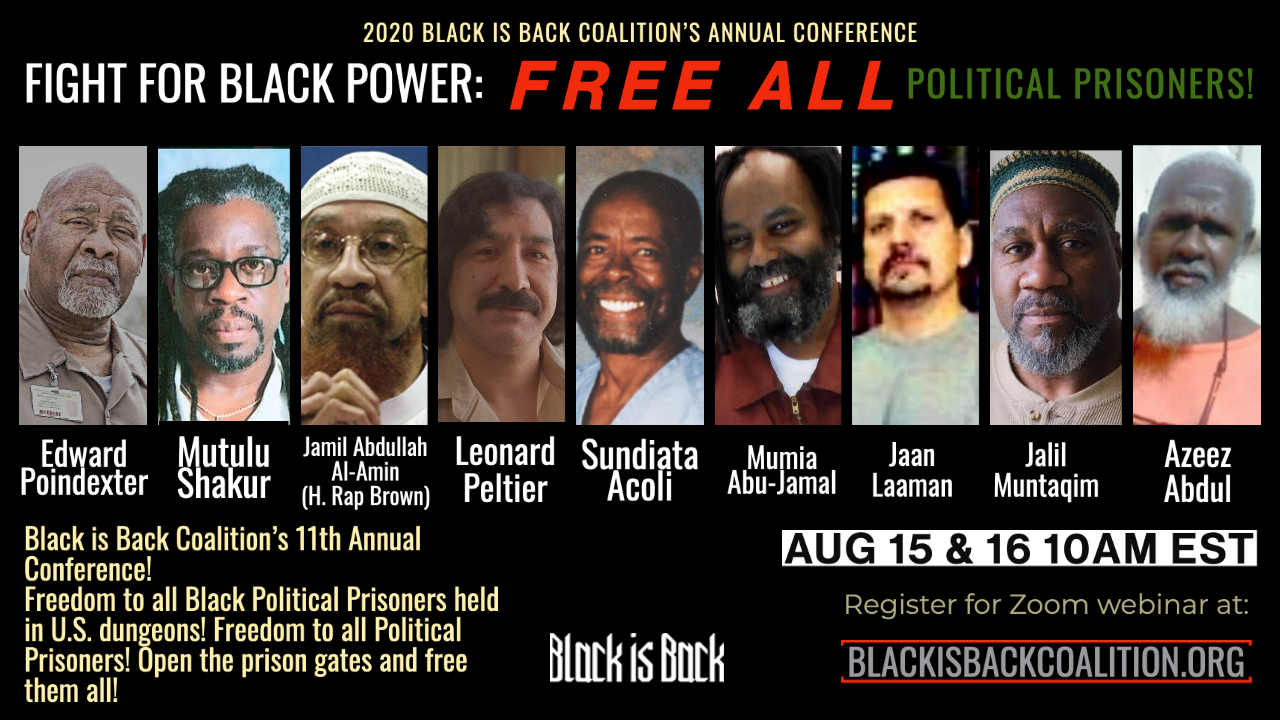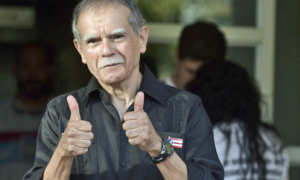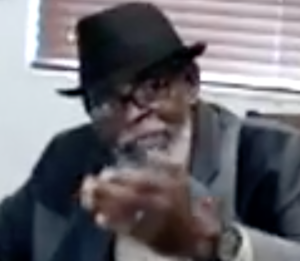The fight for Black Power requires the immediate release
of all our political prisoners!
REGISTER HERE
On August 15 and 16 the Black is Back Coalition for Social Justice, Peace and
Reparations will hold its 11 th Annual Conference. The Conference will hear reports
from leaders of the more than 15 organizations comprising the Coalition. The
various working groups of the Coalition will also report on their work over the last
year since the last Annual Conference.
The month of August is recognized as “Black August” by many militants
associated with the prison movement. This is due in part to the impact of George
Jackson, imprisoned revolutionary and Field Marshal of the Black Panther Party,
who was killed in San Quentin prison on August 21, 1971. Jackson was murdered
by prison guards one year after his 17-year-old brother, Jonathan, was killed
escaping from a Marin County courthouse siege after taking three people hostage
and demanding the liberation of black political prisoners known as the Soledad
Brothers.
Black August is also significant in the African liberation movement because
it is the birth month of Marcus Garvey, who was born on August 17, 1887. Garvey
built the largest, most influential African liberation organization and anti-
imperialist movement since our colonial enslavement.
The 2020 Annual Conference of the Black is Back Coalition will focus on the
issue of political prisoners and Black Power. It is a theme that speaks to this
moment in history when the resistance of African people threatens to derail the
2
imperialist locomotive that has enslaved and dominated Africans and the world’s
peoples for the last few hundred years.
Millions of people within the U.S. and throughout the world have been
thrust into political motion since the May 25, 2020 blatant police murder of
George Floyd, a 46-year-old African subject of U.S. domestic colonialism.
The length, breadth and ferocity of the spontaneous mobilizations in
response to Floyd’s murder reveal the depth of the crisis of the entire world
capitalist social system that has slavery and colonialism as its foundation.
The domestic military arm of the state, called police, is the primary
organization of government that most imposes itself into the lives of black people
and many of the oppressed of the world every day.
This is why the U.S. has the world’s largest prison population, with Africans
along with so-called “Hispanics” and other colonized Indigenous people
constituting two-thirds of those who are incarcerated.
An April 20, 2015 article in the New York Times revealed that more than 1.5
million African men in the U.S. are missing from everyday life primarily due to
mass imprisonment and early death.
This is the mostly unrecognized reality for our people in the U.S. that
underlies the uprising of Africans responding to the murder of George Floyd. The
police that killed Floyd are also the key state organization responsible for the
numbers of Africans in prison and a major contributor to the early death rate in
our communities.
Africans and other colonial subjects were forced into our relationship with
the U.S. through gunpoint as colonial slaves. The police are the domestic colonial
military forces of state power that came into existence just to protect the rulers
3
and the status quo or the existing state of affairs between the oppressed and the
oppressor.
This is because people will not willingly submit to colonial slavery – the
theft of land, labor, freedom and human dignity — and a life of brutal and
humiliating perpetual servitude. Inevitably the people will rise up in resistance.
This is what is represented in the explosion of protest following the
grotesque murder of George Floyd. And if today’s resistance appears unusual it is
only because the U.S. has succeeded in hiding evidence of our anti-colonial
struggle in the 1960s when, unlike the movement of this era, protest achieved a
revolutionary character.
During that time courageous men and women boldly stepped forward,
sometimes with arms in hand, to challenge the cruelest and most powerful
opponent of our freedom, the hegemon that bestrode the world of poverty and
broken dreams it had created.
Many of those people rot in prison today, more than two generations later.
Others died in prison or as a consequence of having been imprisoned. Others
have fled underground or, like Assata Shakur, escaped to other countries.
The U.S. has always presented itself to the world as the premier champion
of freedom and democracy. It has created the narrative that its shores are the
magnet for the freedom-seeking oppressed of the world. It is a narrative that
flows effortlessly from lips and pens of white settlers who explain their own
presence and wellbeing in the U.S. as stemming from a mystical, inherent, quality
of this land and government.
Because of this, because it did brutally silence the resistance of the sixties
in the U.S. and much of the world, because its military and economic power
4
dominates the world, the U.S. has been able to control its sanitized image and
minimize any critique that contradicts its self-definition.
Until now.
Now there have been millions of protesters and uprisings in the U.S. since
May 25. This has forced even the usual government-complicit media corporations
to initiate penitence-laden, empirical-based evidence of an unrelenting history of
African oppression and exploitation to explain the protests and uprisings.
This is the perfect time — when the people’s uprising threatens the long-
term stability of the U.S. government and the capitalist system stands naked and
trembling before the world — to demand the immediate release of those selfless
and implacable freedom fighters whose resistance earned them the enmity of the
U.S. settler state.
We must add the existence of the concentration camps called prisons to
the historical crimes of the U.S. against our people. We must expose the presence
of political prisoners who dared to challenge the reality that the U.S. is only now
reluctantly being forced to acknowledge.
The U.S. has to deny the existence of political prisoners to protect its
severely frayed veneer of the well-meaning, if sometimes bumbling, purveyor of
democracy and justice. Forcing the presence of U.S.-held and tortured political
prisoners onto full public view is fundamental to the anti-colonial struggle for
Black Power that George Jackson and Marcus Garvey pursued until their death.
Forward to the August 15-16 Black is Back Coalition Annual Conference!
Freedom to all Black Political Prisoners held in U.S. dungeons!
Freedom to all Political Prisoners!
Open the prison gates and free them all!



